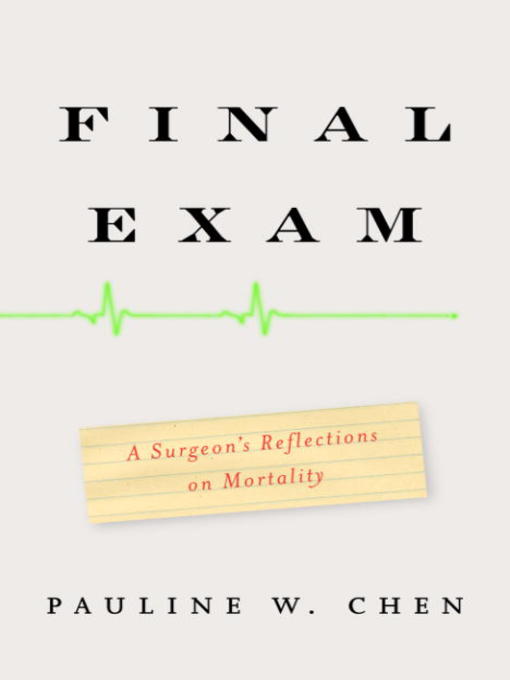
Final Exam
A Surgeon's Reflections on Mortality
تاملاتی در مورد مرگ و میر:
کتاب های مرتبط
- اطلاعات
- نقد و بررسی
- دیدگاه کاربران
نقد و بررسی

November 20, 2006
Like most physicians, Chen, a transplant surgeon and former UCLA faculty member, entered medicine in order to save lives. But as a medical student in the 1980s, she discovered that she had to face death repeatedly and "found disturbing inconsistencies" as she learned from teachers and colleagues "to suspend or suppress any shared human feelings for my dying patients." Chen writes with immaculately honed prose and moral passion as she recounts her quest to overcome "lessons in denial and depersonalization," vividly evoking the paradoxes of end-of-life care in an age of life-preserving treatments. Chen charts her personal and professional rites of passage in dealing with mortality, from her first dissection of a human cadaver, through the first time she pronounces a patient dead, to having to officially took responsibility for the accidental death of a patient in her care. Focusing on the enormous moral and psychological pressures on doctors and on the need for greater empathy in hospital end-of-life care, Chen also reports on signs of change within the profession, stemming from both criticisms of training and institutions and from physicians' initiatives to bring a greater sense of shared humanity to their work. Announced first printing of 75,000.

January 1, 2007
Numerous articles and books have shown that many physicians do not know how to treat terminally ill patients appropriately and humanely. Some physicians, in fact, use extreme and futile medical interventions to treat dying patients, with little regard to their costs, the pain and suffering they cause, or even the patients' own wishes. Chen, a young Asian American transplant surgeon, further addresses this profound paradox of medicinea profession premised on caring for the ill that systematically depersonalizes the dyingby compiling her own experiences dealing with death and dying. She skillfully interweaves personal narratives of her patients with reflections of broader issues in medical education and end-of-life care. Readers learn how Chen's medical training and clinical practice inappropriately taught her and other physicians coping mechanisms to deal with, deny, and, in many cases, depersonalize dying patients. Chen also reflects on needed changes in medicine and individual practices. This well-written, thoughtful, and engaging book is highly recommended for both public and academic libraries. [See Prepub Alert, "LJ" 9/1/06.]Ross Mullner, Sch. of Public Health, Univ. of Illinois, Chicago
Copyright 2007 Library Journal, LLC Used with permission.

December 15, 2006
There is a vast popular literature about physician ineptitude with dying and death, whose doctor authors often cite their own cases to make points. Chen takes the logical next step by recounting only her immediate experience with dying and dead persons and what she learned from it. She starts with her first dead "patient," the woman she dissected in anatomy class. She continues with the many, many deaths she witnessed as an intern and resident and later. She poses them against the backdrop of being encouraged to disengage emotionally from patients and to opt always for prolonging life. She recounts, with pain, her own failures to "be there" for dying patients and their loved ones. She notes recent medical education reforms aimed at helping physicians accept death and prepare patients and loved ones for it. She recalls, with wonder, good physician dealings with death--those of doctors she learned from and, finally, her own. A graceful, precise, and empathetic writer enthralled by her work, Chen imparts much about medical schooling and surgery, too.(Reprinted with permission of Booklist, copyright 2006, American Library Association.)

























دیدگاه کاربران